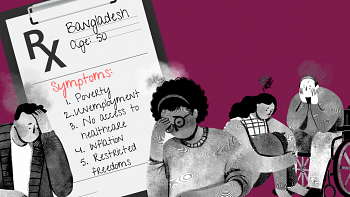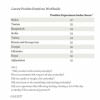What makes Bangladesh 7th saddest nation in the world?

The lead headline in this newspaper on July 4 reminded us of the arrival of an austere time, but another story inside was even more depressing, telling us that, according to the Global Emotions Report 2022, Bangladesh is the seventh saddest nation in the world. And we became miserable well before the onset of high inflation and cost of living crisis. How was it possible? Haven't we got dozens of occasions round the year to celebrate – some religious, some cultural, and many more political? Or are we about to hear that some quarters opposed to the government and its world-class development have been conspiring against us? The Global Emotions Report, however, is not produced by any of the opposition parties, including the BNP, or any human rights groups. It is a report by the global polling giant Gallup, constructed as part of its annual survey on people's emotional well-being.
In its quest for assessing the emotional state of people and what contributes to their happiness or unhappiness, Gallup asks hundreds of thousands of people in 122 countries questions about both positive and negative emotions. Think about how you felt yesterday. Did you smile or laugh a lot? Did you learn or do something interesting? Were you angry? Sad? It also asks whether someone was treated with respect, felt well-rested, or suffered from stress. Gallup asks people to imagine a ladder, with the lowest rung representing the worst possible life and the highest rung representing the best possible life. People rate where they stand today and where they expect to stand in three years. Based on how they respond, Gallup classifies them as thriving, struggling, or suffering.
According to this index, we are not thriving, not even struggling, but are suffering. Every resident of Dhaka knows well how much stress one has to cope with just to survive every day. They don't need the Economist Intelligence Unit to tell them that their capital is the seventh least liveable city in the world. Its pollution level, air quality, noise, availability of clean water, traffic jams – all rank among the worst. Unless someone is a superhuman having supreme patience, it is quite natural that people would forget to smile, and become angry and sad all the time.
Though the world is suffering from war, inflation, and a once‑in‑a-lifetime pandemic, Jon Clifton, the global managing partner of Gallup, said the global rise of unhappiness started long before any of those issues made headlines. In fact, unhappiness has been rising for a decade, he said in the report. And the report identifies five significant contributors to the rise of global unhappiness: Poverty, bad communities, hunger, loneliness, and the scarcity of good work. Economists have long been saying that inequalities are rising alarmingly in our growth strategy, which has not created quality jobs as much as it should be. And the Covid pandemic has worsened it further, increasing poverty and hunger. And now, rising inflation and a prolonged war would certainly be bringing in further distress and despair.

Another part of the study has produced the World Happiness Report for the United Nations focusing on different variables, such as income, health, and social support. Could that have a different result that can cheer us up? The World Happiness Report, which has used statistical analysis to determine the world's happiest countries, concluded that Finland retained its standing as the happiest country in the world for the fifth consecutive year. To determine the world's happiest country, researchers analysed comprehensive Gallup polling data from 149 countries for the past three years, specifically monitoring performance in six particular categories: Gross domestic product (GDP) per capita, social support, healthy life expectancy, freedom to make your own life choices, generosity of the general population, and perceptions of internal and external corruption levels.
Unfortunately, these results won't cheer you up either as Bangladesh ranked 94th on the list. We know that our government attaches the highest importance to making our country a high-growth economy, raising per capita GDP, and graduating to a developing country. So, where do we stand after a decade-long pursuit for economic prosperity and well-being of the people? Besides GDP and life expectancy, among other things, Gallup questions included, "Are you satisfied or dissatisfied with your freedom to choose what you do with your life?" and "Is corruption widespread throughout the government/businesses in this country or not?" Would one be mistaken in drawing the conclusion that lack of freedom and widespread corruption, both in public and private sectors, are the reasons that keep us stuck in the lower rankings of global indices?
Other nations faring as badly as ours in the ranking of sadness or unhappiness are mostly known to be entangled in conflicts. One critical element of the study shows that Bangladesh has done equally badly in both the Positive Experience Index and the Negative Experience Index. In the Positive Experience Index, the 10 lowest-scoring countries include our neighbours Nepal and India, along with Egypt, Tunisia, Ukraine, and Georgia. But their scores in the Negative Experience Index are not so poor.
The authors of the report claim that higher scores in the Positive Experience Index indicate that positive emotions are more pervasive in a country. These scores strongly relate to people's perceptions of their living standards, personal freedoms and the presence of social networks. On the contrary, in the Negative Experience Index, the higher the score, the more pervasive negative emotions are in a country. People's experiences with health problems and their ability to afford food are predictive of higher negative scores. Reading such analyses would surely make one even sadder.
Kamal Ahmed is an independent journalist and writes from London, UK. His Twitter handle is @ahmedka1

 For all latest news, follow The Daily Star's Google News channel.
For all latest news, follow The Daily Star's Google News channel. 









Comments